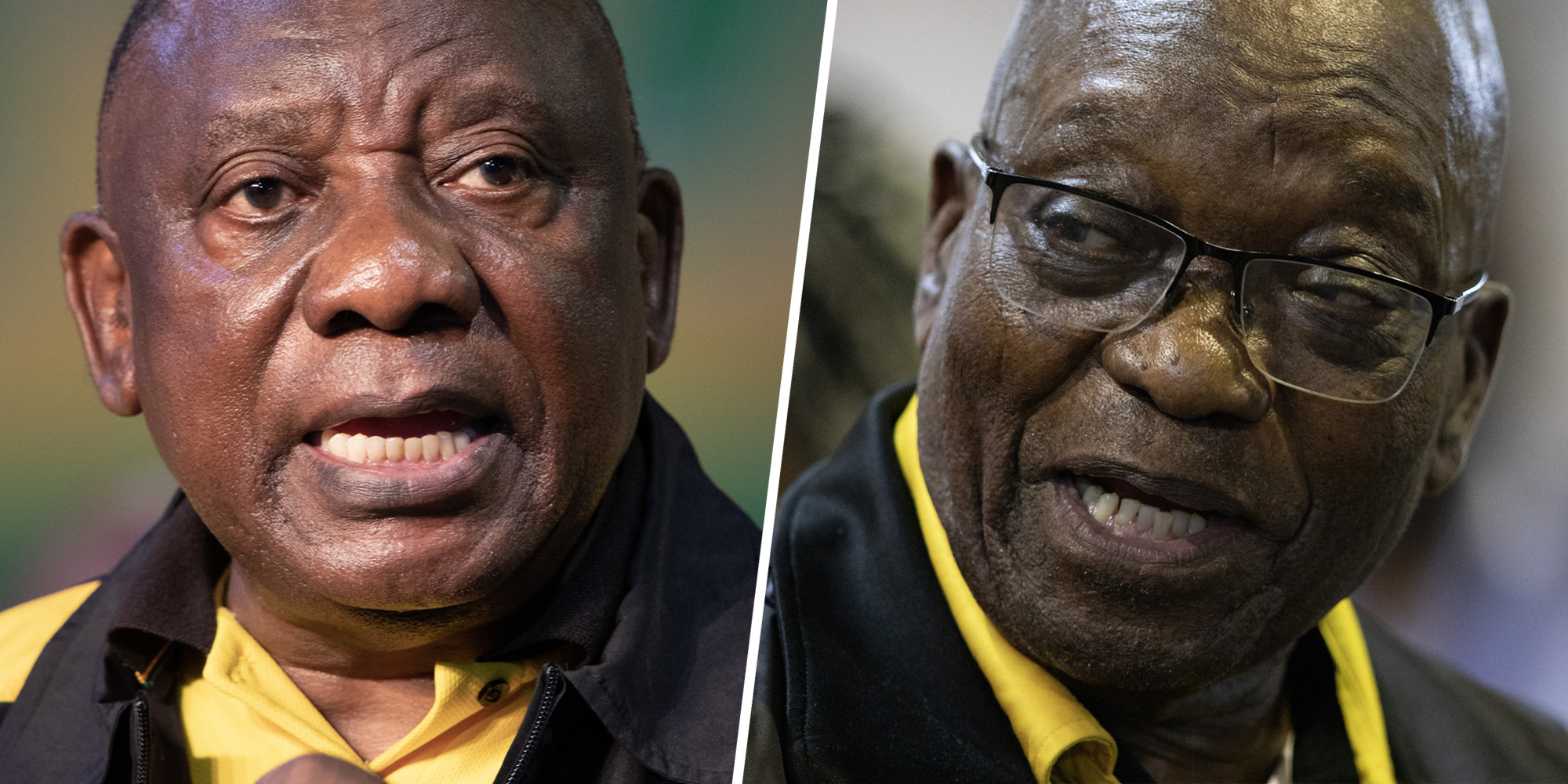Ron Simphiwe Mncwabe and Khulekani Raymond Mathenjwa were appointed directors of public prosecutions in North West and Mpumalanga respectively, a week before Jacob Zuma left office.
Records show Zuma signed a presidential minute on their appointments on 7 February 2018. He resigned seven days later without announcing the appointments.
When Cyril Ramaphosa took office, he was suspicious of the timing of the appointments at the National Prosecuting Authority (NPA). He halted these and three others Zuma had signed off on.
Now, the Constitutional Court is being asked to adjudicate on which of the two presidents acted unlawfully: Zuma for making the appointments; or Ramaphosa for cancelling them.
At the heart of the case is the question of when a presidential order becomes final. Mncwabe and Mathenjwa say it’s when the President signs a presidential minute, whereas Ramaphosa argues it’s when the decision is publicly communicated.
‘Undisputed facts’
Mncwabe and Mathenjwa have applied for their cases to be heard by the Constitutional Court after their cases were dismissed at the high court and the Supreme Court of Appeal. They question the constitutionality and rationale of Ramaphosa’s decision to remove them.
In his founding affidavit, Mncwabe says the high court judge who dismissed his initial application erred in his finding by insisting that the appointment should have been publicly communicated to make it effective.
“It is submitted that it is a matter of unusual public importance that warrants the attention of the Court, insofar as it concerns the appointment by the President of one of the most senior prosecuting officers in South Africa,” Mncwabe says in his founding affidavit.
Provincial directors of public prosecutions (DPP) are the most senior NPA officials in each province and make decisions about which cases are prosecuted.
Core questions
Mncwabe argues his appointment should be considered final because Zuma signed a presidential minute, which was countersigned by the then justice minister, Michael Masutha, and communicated to him via advocate Shaun Abrahams, former national head of the NPA.
“It was not open to President Ramaphosa to revoke my appointment. The principle of legality dictates that an organ of state may not unilaterally rescind a prior decision, even if such a decision was unlawful, but must approach a court to have its prior decision set aside,” Mncwabe argues.
“The core question on appeal would be whether, on the undisputed facts, the decision to appoint me as DPP must be deemed to be final.”
He added that the high court “read in” a requirement that Zuma’s decision should have been publicised, saying that nowhere in legislation did it require an executive decision to be publicised before becoming final.
“While it is of course true that the public has a direct interest in the identity of the DPP, that does not entail that the decision of the President to appoint me to that post is not final, simply because there was no contemporaneous public announcement,” Mncwabe argues.
‘Invalid, irrational and inconsistent’
Mathenjwa makes similar points in his heads of argument, saying Zuma complied with the requirements of the NPA Act and Constitution when appointing him.
“Mathenjwa contends that President Ramaphosa’s decision to revoke his appointment is unlawful, invalid, irrational and inconsistent with the constitution and consequently should be reviewed and set aside,” he argues.
Mathenjwa is also critical of the high court decision by Judge DS Fourie.
“The judgment comes down to a single judge’s view on the requirements and process for the appointment of a DPP, which view is not supported by section 13 (1)(a) of the NPA Act read with sections 179 (3) and (7) of the Constitution. In view of the clear wording of the legislation, Fourie J’s reading in, and imposing and imposing of, an obligation of public notification section 13 (1)(a) of the NPA Act effectively amounts to a legislative amendment,” he argues.
The Presidency says Ramaphosa was acting within the law by cancelling the appointments. Phindile Baleni, director general in the Presidency and secretary to Cabinet, argues in an affidavit before the court, that Ramaphosa got legal advice before the reversal.
“He engaged with the erstwhile Minister of Justice and Advocate Abrahams regarding these proposed appointments to allay his concern that the senior NPA appointments may have been fast-tracked ahead of President Zuma’s resignation and to apply his mind as to the appropriateness of the proposed individuals given the seniority of the positions concerned and the issues plaguing the NPA,” Baleni said.
Broken telephone
Baleni also questions whether the parties were properly informed of their appointments, saying Mncwabe was informed via Whatsapp and telephone by Abrahams, not the Presidency.
“Advocate Abrahams also sent him a copy of the presidential minute purporting to appoint him via WhatsApp messenger. A hard copy of the minute was also apparently sent to [Mncwabe] in November 2018. On the same day, 7 February 2018, [Mncwabe] received another phone call from Advocate Abrahams in which he made mention of the political climate at the time and informed the applicant that he must await communication of his appointment from the President.”
Visit Daily Maverick’s home page for more news, analysis and investigations
The communication from the Presidency did not come and Zuma resigned a week later. The vacancies that Mthenjwa and Mncwabe were meant to fill have since been filled by other people and the Presidency says undoing these appointments would cause problems within the NPA.
“The DPP: Northern Cape has been vacant since 25 June 2016. This has become an intolerable situation for the NPA, undermining service delivery as deputies have filled the position, creating a shortage of staff to execute the office’s core functions. There needs to be stability in leadership and the non-filling of the DPP: NC position was creating instability,” Baleni says.
The matter is due to be argued on 7 February. DM




